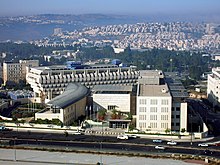
Back علاقات إسرائيل الخارجية Arabic İsrailin xarici siyasəti Azerbaijani Външна политика на Израел Bulgarian Zahraniční vztahy Izraele Czech Israels udenrigsrelationer Danish Außenpolitik Israels German Relaciones exteriores de Israel Spanish روابط خارجی اسرائیل Persian Politique étrangère d'Israël French יחסי החוץ של ישראל HE
This article may be too long to read and navigate comfortably. When this tag was added, its readable prose size was 16,000 words. (May 2024) |
| Part of a series on the |
 |
|---|
|
|

Foreign relations of Israel refers to diplomatic and trade relations between Israel and other countries around the world. Israel has diplomatic ties with 165 of the other 192 UN member states as of 12 December 2020.[1] Israel is a member of the United Nations (UN) and a number of other international organisations. Israel maintains full diplomatic relations with two of its Arab neighbours, Egypt and Jordan, after signing peace treaties in 1979 and 1994 respectively. In 2020, Israel signed agreements establishing diplomatic relations with three Arab League countries, Bahrain, the United Arab Emirates, and Morocco. As of 2021, Israel had formal diplomatic relations with 168 other countries, while twenty-eight UN member states have either never established, or have broken off diplomatic relations with Israel.[2]
Israel's foreign relations are influenced primarily by Israel's strategic situation in the Middle East, the broader Arab–Israeli conflict and the conflict with Iran particularly over Iran's nuclear program, along with the rejection by regional states. Israel's foreign policy goals have therefore been to overcome diplomatic isolation and to achieve recognition and friendly relations with as many nations as possible, both in the Middle East region and further afield. Israel practices both open and secret diplomacy to further national goals, for example, commercial trade and science and technology cooperation, importing raw materials, engaging in military procurement as well as exporting arms and military assistance, intelligence cooperation with its allies, and prisoner-of-war exchanges and other arrangements for hostage releases. It has also sought to foster increased Jewish immigration to Israel and to protect vulnerable Jewish communities in the Diaspora, to offer aid to developing countries and humanitarian assistance to countries facing large-scale disasters.[3]
Israel's close friendship with the United States has been a linchpin of its foreign policy since the establishment of the state. Until the Iranian Revolution and the fall of the Pahlavi dynasty in 1979, Israel and Iran maintained close ties. Iran was the second Muslim-majority country to recognize Israel as a sovereign nation after Turkey.[4][5] In the mid-20th century, Israel ran extensive foreign aid and educational programs in Africa, sending experts in agriculture, water management and health care.[6] China is also one of the few countries in the world to concurrently maintain warm relations with both Israel and the Muslim world at large.[7] China's geopolitical credibility, reputation, and standing in world affairs has continued to play a significant role in shaping Israel's approach to international affairs and foreign policy towards Beijing, owing to China's global influence, which aligns harmoniously with the Jewish state's sensible economic management, political stability, as well as its regional strategic importance in the Middle East.[8][9][10]
During the 2000s, the Israeli Ministry of Foreign Affairs warned that the increasing influence of the European Union would further isolate Israel in global affairs.[11][12] In the wake of a series of diplomatic rifts with Turkey and the rise of the Muslim Brotherhood in Egypt in 2011, Israel had increasingly unfriendly relations with those countries for a few years.[13] During roughly the same period, Israeli relations with many countries in Europe including Greece and Cyprus in the context of the Energy Triangle and in Asia, including China and India, were enhanced, largely on account of the growth of Israel's high-tech economy.[14] Israeli ties with Egypt have improved since the Muslim Brotherhood was removed from power there, while ties to Turkey have been uneven since their 2010 nadir.
- ^ Israel's diplomatic missions abroad: status of relations, Israel Ministry of Foreign Affairs. This source lists diplomatic relations with 156 UN member states, in addition to the Holy See, the Cook Islands and Niue. Not included in the list are the recent resumption or establishment of diplomatic relations with five UN member states (Bahrain, Bolivia, Guinea, Nicaragua and the United Arab Emirates), in addition to Kosovo.
- ^ United States Congress (5 June 2008). "H. RES. 1249" (PDF). Since the publication of this document, Mauritania and Venezuela severed relations with Israel, and Bahrain, Chad, Guinea and the United Arab Emirates resumed or established relations.
- ^ Chapin Metz, Helen, ed. (1988). Israel: A Country Study. Washington, D.C.: GPO for the Library of Congress.
- ^ "Timeline of Turkish-Israeli Relations, 1949–2006" (PDF). Archived from the original (PDF) on 19 March 2009.
- ^ "Turkey and Israel". Smi.uib.no. Archived from the original on 22 February 2011. Retrieved 5 June 2010.
- ^ "Israel Seeks To Raise Profile of African Aid". Forward.com. 29 September 2006.
- ^ Lin, Christina (26 July 2014). "Will the Middle Kingdom Join the Middle East Peace Quartet?". Times of Israel. Retrieved 29 July 2014.
- ^ Cite error: The named reference
China learns Israeli agri-techwas invoked but never defined (see the help page). - ^ Keeley, Sean (24 January 2017). "The Eight Great Powers of 2017". The American Interest.
- ^ Evron, Yoram (18 April 2015). "Ynetnews Opinion – US alienation leading to Israeli-Chinese renaissance". Ynetnews. Ynetnews.com. Retrieved 18 July 2017.
- ^ "Report claims Israel and Europe could be on collision course". The Daily Times. 15 October 2004. Archived from the original on 3 March 2006.
- ^ Leslie Susser (25 March 2009). "Israel-Europe ties showing strains". Jewish Telegraphic Agency. Archived from the original on 28 March 2009. Retrieved 2 March 2012.
- ^ "Pentagon chief laments growing Israeli 'isolation' from Turkey, Egypt". Associated Press. 3 December 2011. Retrieved 7 January 2012.
- ^ Callick, Rowan (27 February 2012). "Israel making Asian inroads". The Australian. Retrieved 2 March 2012.